A new article entitled “Researching for Desirable Futures: From Real Utopias to Imagining Alternatives” co-authored with Juliane Reinecke was published in the Journal of Management Studies. There is also an accompanying blogpost to add more context.
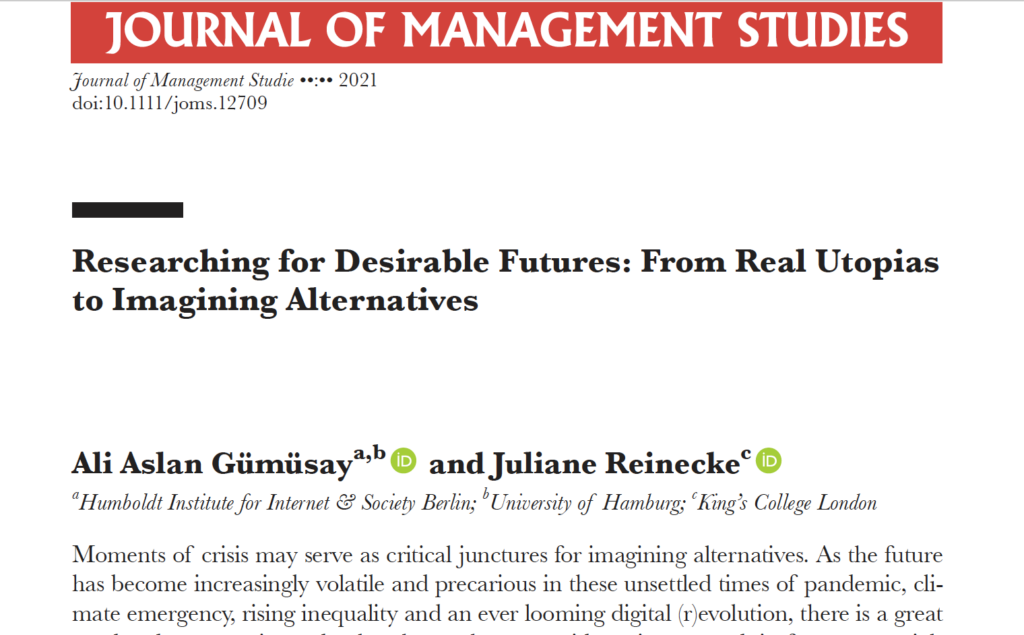
Happy to announce that the article “The Potential for Plurality and Prevalence of the Religious Institutional Logic” has been published at Business & Society.
Religion is a significant social force on organizational practice yet has been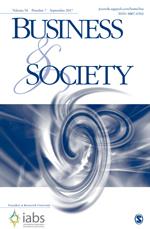 relatively underexamined in organization theory. In this article, I assert that the institutional logics perspective is especially conducive to examine the macrolevel role of religion for organizations. The notion of the religious logic offers conceptual means to explain the significance of religion, its interrelationship with other institutional orders, and embeddedness into and impact across interinstitutional systems. I argue for intrainstitutional logic plurality and show that specifically the intrareligious logic plurality has been rather disregarded with a relative focus on Christianity and a geographical focus on “the West.” Next, I propose the concept of interinstitutional logic prevalence and show that the religious logic in particular may act as a metalogic due to its potential for uniqueness, ultimacy, and ubiquity. Through illustrations from Islamic Finance and Entrepreneurship, I exemplify implications of logic plurality and prevalence for organizations and societies.
relatively underexamined in organization theory. In this article, I assert that the institutional logics perspective is especially conducive to examine the macrolevel role of religion for organizations. The notion of the religious logic offers conceptual means to explain the significance of religion, its interrelationship with other institutional orders, and embeddedness into and impact across interinstitutional systems. I argue for intrainstitutional logic plurality and show that specifically the intrareligious logic plurality has been rather disregarded with a relative focus on Christianity and a geographical focus on “the West.” Next, I propose the concept of interinstitutional logic prevalence and show that the religious logic in particular may act as a metalogic due to its potential for uniqueness, ultimacy, and ubiquity. Through illustrations from Islamic Finance and Entrepreneurship, I exemplify implications of logic plurality and prevalence for organizations and societies.
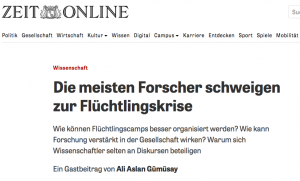
Wie können Flüchtlingscamps besser organisiert werden? Wie kann Forschung verstärkt in der Gesellschaft wirken? Warum sich Wissenschaftler selten an Diskursen beteiligen. Artikel hier.
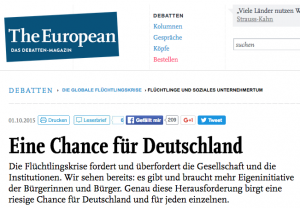 Die Flüchtlingskrise fordert und überfordert die Gesellschaft und die Institutionen. Wir sehen bereits: es gibt und braucht mehr Eigeninitiative der Bürgerinnen und Bürger. Genau diese Herausforderung birgt eine riesige Chance für Deutschland und für jeden einzelnen. Artikel hier.
Die Flüchtlingskrise fordert und überfordert die Gesellschaft und die Institutionen. Wir sehen bereits: es gibt und braucht mehr Eigeninitiative der Bürgerinnen und Bürger. Genau diese Herausforderung birgt eine riesige Chance für Deutschland und für jeden einzelnen. Artikel hier.
Das Buch “Das islamische Wirtschaftsrecht” herausgegeben von 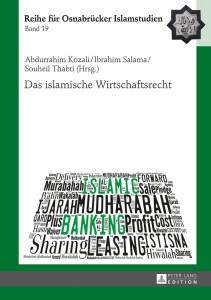 Abdurrahim Kozalı, Ibrahim Salama & Souheil Thabti, ist erschienen.
Abdurrahim Kozalı, Ibrahim Salama & Souheil Thabti, ist erschienen.
Es basiert auf einer gleichnamigen Tagung, die an der Universität Osnabrück stattfand. Ich durfte ein Kapitel zu Unternehmertum aus einer islamischen Perspektive beisteuern. Eine Zusammenfassung des Vortrages & damit auch Kapitels schrieb Souheil Thabti für die Gesellschaft für Arabisches & Islamisches Recht in einer Mitteilung:
“Mit dem Vortrag des Doktoranden Herrn Gümüsay (Universität Oxford), der über das Unternehmertum im islamischen Verständnis (EIP, Entrepreneurship from an Islamic Perspective) und seine Auswirkung auf die Arbeitsweise in Unternehmen referierte, endete der erste Konferenztag. Seine Untersuchungen zielen darauf ab herauszufinden, wie ein Unternehmen wirtschaftet, das von einem religiösen Muslim geführt wird, wie ein religiöser Geschäftsführer entscheidet und wie sich Shareholder verhalten.
Im Fokus seiner Betrachtung standen drei miteinander in Zusammenhang stehende Säulen, auf denen EIP basiere: Die erste Säule bestehe im Streben nach Möglichkeiten, Wert zu schaffen, die zweite sei eine sozio-ökonomische bzw. ethische, die auf die gesellschaftlichen Interessen und Bedürfnisse abstelle, und schließlich stelle die dritte Säule die religiös-spirituelle Grundlage dar. Gümüsay zufolge stehen diese Säulen in einem Zusammenspiel und beeinflussen sich gegenseitig. EIP sollte nicht bloß als soziales oder ethisches Unternehmertum verstanden werden, weil letzteres nicht auf religiösen Textquellen basiere und keinen konkreten religiösen Vorgaben folge.
Auch stellte er klar, dass EIP nicht Muslimen allein vorbehalten sei, sondern auch Nicht-muslimen offenstehe. Ein Unternehmen, das sich islamischen Vorgaben verschreibe, müsse in seiner Unternehmensstruktur Personal (Geschäftsleitung, Mitarbeiter, etc.) muslimischen Glaubens aufweisen, um als islamisch bezeichnet werden zu können. Ungeachtet dessen stelle der Islam an sich keine ökonomischen Theorien auf, weshalb es verfehlt sei, von Islamic Entrepreneurship oder Islamic Finance zu sprechen. Vielmehr biete der Islam einen Rahmen, innerhalb dessen Ökonomen selber Theorien und Modelle aufstellen könnten. Man solle daher von einer Ökonomie bzw. einem Unternehmertum aus islamischer Perspektive sprechen, die/das auf islamischen Werten gründe und sich am Rahmen dieser orientiere.
Die Tatsache, dass auch Menschen mit religiösem Bezug Unternehmen leiteten oder in Unternehmen arbeiteten, zeige die Wichtigkeit der Einbeziehung der Religion als Element in die Unternehmensforschung. Dabei wirke sich EIP auf der Mikro-Ebene (Einzelunternehmen), Meso-Ebene (die zwischen Mikro- und Makro-Ebene vermittele, z. B. Organisationen) und Makro-Ebene (Markt, Staat) aus. Er kommt zu dem Ergebnis, dass in diesem Bereich noch viel interdisziplinär geforscht und Religion als ein den Menschen prägendes Element mehr in die wissenschaftliche Unternehmensforschung einbezogen werden sollte.”
Weitere Zusammenfassungen hier.
Blogpost first published at the Skoll Centre for Social Entrepreneurship Website.
Making science useful
Academia is far too often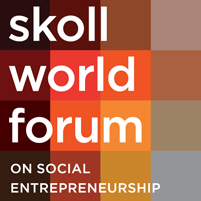 removed from practice. Thousands of books and articles are written about innovation and practitioners feel inclined to ask: so what? Johanna Mair, Professor of Organization, Management and Leadership at the Hertie School of Governance and Academic Editor of the Stanford Social Innovation Review and Christian Seelos, a visiting scholar at the Stanford University Center on Philanthropy and Civil Society who previously directed the IESE Platform for Strategy and Sustainability, feel and understand this frustration. In a session on the balancing act of innovation and scale at the Skoll World Forum they engage with the audience as a step towards bridging these diverging worlds: by intervening more productively in the world in a scholarly way.
removed from practice. Thousands of books and articles are written about innovation and practitioners feel inclined to ask: so what? Johanna Mair, Professor of Organization, Management and Leadership at the Hertie School of Governance and Academic Editor of the Stanford Social Innovation Review and Christian Seelos, a visiting scholar at the Stanford University Center on Philanthropy and Civil Society who previously directed the IESE Platform for Strategy and Sustainability, feel and understand this frustration. In a session on the balancing act of innovation and scale at the Skoll World Forum they engage with the audience as a step towards bridging these diverging worlds: by intervening more productively in the world in a scholarly way.
From innovation as an ideology to innovation as a process
Much scholarly attention concentrates on the creation of social ventures neglecting established organizations and the question of how to innovate continuously. Mair and Seelos stress that innovation needs to be seen as a process, not an ideology: “Innovation is not the holy grail.” We often overrate the value of innovation, undervalue the importance of failed innovation and underappreciate the difficulty of innovation. Innovation is a complex process and a long and continuous development from idea over evaluation to experimentation. Along the way organizations face many pitfalls. Ideas often never get started; or end too early. Reasons are, for example, a strong target focus, power struggles, fearing punishment and potential failures, a homogenous workforce and too much distance of managers from the frontline.
Productive innovation
Andrew, a Skoll World Forum attendee, comments: “The ideas are there, but opportunities are not.” Many heads nod. The remark hits one of the core problems that Mair and Seelos convey: Organisations need innovation routines and processes. Ideas are normally not enacted by individuals. They require groups and both formal and informal engagement. Innovation consists of idea generation, evaluation, experimentation and enactment. Within this difficult and complex process, organisations should artistically balance innovation and scale by exploiting past and targeting future innovations given the availability of resources – in a process of productive innovation.
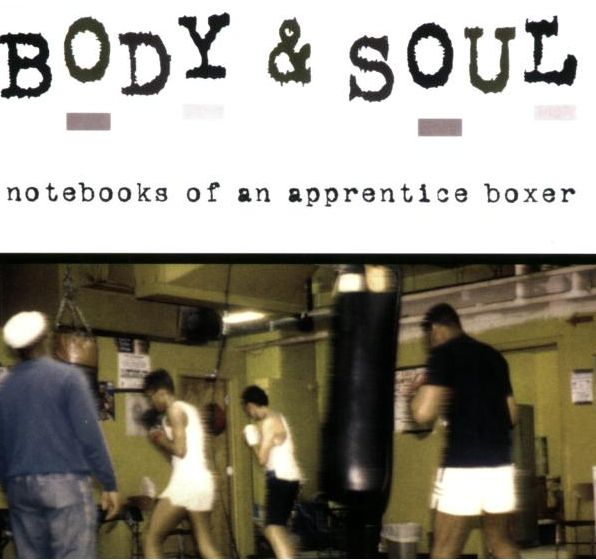 I have written an article for the forthcoming Special Issue of the Journal of Management Development. The overarching theme of the Special Issue is the Practical Wisdom for Management from the Islamic Tradition. In a former version of the article, I briefly compared my ethnographic experience in a Sufi Dhikr Circle, a mystical Islamic organization, with Wacquant’s experience as a participant-observer of boxing. This section did not make it into the final article. So here it is:
I have written an article for the forthcoming Special Issue of the Journal of Management Development. The overarching theme of the Special Issue is the Practical Wisdom for Management from the Islamic Tradition. In a former version of the article, I briefly compared my ethnographic experience in a Sufi Dhikr Circle, a mystical Islamic organization, with Wacquant’s experience as a participant-observer of boxing. This section did not make it into the final article. So here it is:
// Comparing ethnographic experiences
Much of the ethnographic experience resembles what Wacquant (2003) depicts in “Body and Soul”. Wacquant (2003, p. xi) describes the difficulty to depict anthropologically the practice of boxing: “how to account anthropologically for a practice that is so intensely corporeal, a culture that is thoroughly kinetic, a universe in which the most essential is transmitted, acquired, and deployed beneath language and consciousness…”. I feel equally in awe while the voice becomes a sound and rhythm mechanism and less a communication tool between humans. Communication through both read-singing and body movements occurs less between humans and rather between us and God, as well as between us and the environment pursuing what may be termed the “Unity of Existence (Lewin, 2000). The environment is not a religious décor, but actants which themselves perform religious practices like dhikr.
// Transcending the boundaries between physical & spiritual
Wacquant (2003, p. 17) continues to illustrate the difficulties in becoming a boxer: “…to become a boxer is to appropriate through progressive impregnation a set of corporeal mechanisms and mental schemata so intimately imbricated that they erase the distinction between the physical and the spiritual, between what pertains to athletic abilities and what belongs to moral capacities and will.” The activities during dhikr seem to have the same goal, to erase the distinction between the physical and the spiritual, between what the body and what the soul focuses on. The result, according to Wacquant (2003, p. 17), is that “[t]he boxer is a live gearing of the body and the mind that erases the boundary between reason and passion, explodes the opposition between action and representation, and in so doing transcends in actu the antinomy between the individual and the collective that underlies accepted theories of social action.” Equally, dhikr erases boundaries or merges the parts of the human being and merges the human with the Circle community and the environment, whereby the human becomes one with himself and with the social (humans) and non-social (environment) surroundings.
Wacquant, L. (2003), Body and Soul: Ethnographic Notebooks of an Apprentice Boxer, Oxford University Press: Oxford.